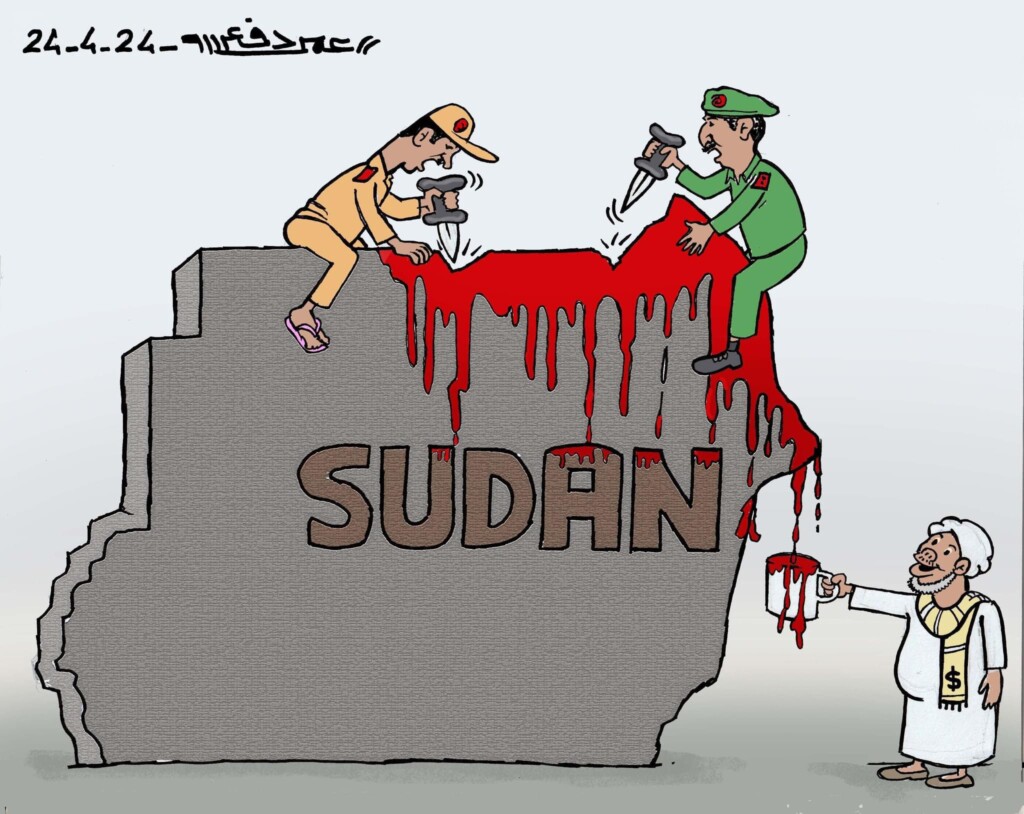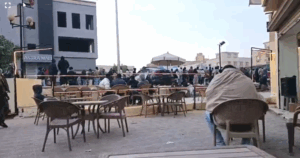UN official: ‘Threat of a major conflict looms over North Darfur capital’

Cartoon: Omar Dafallah / RD
The imminent threat of a major conflict looms over El Fasher, the capital of North Darfur, as tensions swell between the paramilitary Rapid Support Forces (RSF) and the Sudanese Armed Forces along with their allied armed movements. El Fasher, already beset by humanitarian disasters and food scarcity, faces an ominous future.
Toby Harward, Deputy UN Humanitarian Coordinator for Sudan, spoke to Radio Dabanga reporter Omar Abdelaziz, with his insights into the situation in El Fasher and the broader humanitarian efforts in the region.
RD: You’ve been leading the UN’s endeavours to provide relief to El Fasher. Could you shed some light on the progress of these efforts thus far?
“The humanitarian situation in North Darfur and surrounding areas is dire,” Harward remarked. “NGO reports have underscored escalating hunger rates and medical emergencies. Our mission to El Fasher aimed to address these challenges by engaging all stakeholders, enhancing UN presence, and facilitating the delivery of aid. While initial progress was made, escalating tensions during Eid El Fitr disrupted our operations, prompting a temporary withdrawal. However, we remain hopeful that once stability is restored, humanitarian work can resume promptly.”

RD: Regarding the heightened warnings of an imminent attack on El Fasher, what, in your assessment, are the potential ramifications?
Harward expressed grave concern: “The situation in El Fasher is precarious. The city shelters a significant civilian population, including displaced individuals who fled conflict in Darfur. The risk of violence poses a severe threat to their safety and exacerbates the already dire humanitarian conditions. Any escalation could lead to widespread casualties, further destabilising the region, and inciting tribal conflicts.”
RD: Amid reports of the suspension of Humanitarian Aid Commission operations in areas controlled by the RSF, how do you plan to coordinate aid delivery? Are you prepared to engage with the humanitarian relief agency established by the RSF?
“International humanitarian law mandates coordination with relevant authorities for aid distribution,” Harward affirmed. “We collaborate with both government and de facto authorities to ensure the impartial delivery of assistance. Upholding this principle is crucial for reaching vulnerable populations. As for engaging with the RSF’s relief agency, our focus remains on adhering to established humanitarian protocols and ensuring aid reaches those in need, irrespective of the administering body.”
RD: Turning to funding, recent figures suggest a shortfall in aid contributions. What is happening currently, and how much progress has been made?
“Prior to the Paris conference, only around six per cent of the required funds were mobilised,” Harward stated. “Several factors, including the COVID-19 pandemic and competing global crises, contributed to this shortfall. However, pledges made during the conference exceeded €2 billion, marking significant progress. Nonetheless, sustained support is imperative to address the ongoing crisis comprehensively.”
RD: Finally, how do you perceive the impact of global conflicts, such as those in Ukraine and the Gaza Strip, on diverting attention from Sudan’s crisis?
“Regrettably, crises elsewhere have overshadowed Sudan’s plight,” Harward lamented. “While understandable, it’s crucial to recognise the severity of Sudan’s humanitarian crisis. The scale of displacement, violence against women, and food insecurity demand global attention and concerted action. Ignoring these challenges risks perpetuating suffering on an unprecedented scale.”











 and then
and then